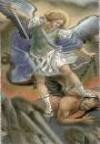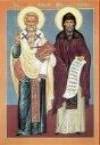knew a lady once who was actually a voodoo mambo. She tried hard to embrace a fully Catholic life but with no priest to exorcise her, she gave up. It is a very difficult practice to from which to escape.
There are many good Catholics going to Haiti to assist in the relief effort. We have a friend in the Navy that is there now and he says the conditions are awful. We have much to pray about. And it is good to know what one is getting into! Just know that in certain parts of this world, all that is labeled Catholic, "ain't necessarily so"...as the song goes.
If you are going to assist in the effort, this writer suggests two things: take all of your Sacramentals and find a priest to pray the old Latin rite of exorcism over you when you return! Seriously, not just for your benefit but for those around you. I know of which I speak...unfortunately.
Haitian Voodoo
by Ojibwa
Thu Jan 14, 2010 at 09:38:19 AM PST
While the island of Hispaniola was originally colonized by the Spanish, in 1697 they ceded the western third of the island to the French. This portion of the island would later become Haiti.
The French colony became one of the wealthiest European colonies in the Caribbean. The wealth came from forestry and sugar which contributed to the environmental degradation of the country. The sugar plantations depended heavily upon slave labor which was imported from Africa. The African slaves brought with them their religion which became known as Voodoo.
The term "Voodoo" (also written as Vodun, Vodoun, Vodou, and other spellings) has its roots in the African word for "spirits." During the colonial era, the French actively suppressed the Voodoo religion. The plantation masters and the Catholic priests forbade all Voodoo practices, so many of these practices were merged with Catholic elements to hide them from colonial authorities.
Voodoo became a mechanism for keeping African cultural elements alive and encouraging ideas of freedom. In the late 18th century, nearly 500,000 African slaves under the leadership of Toussaint L’Ouverture began a revolt and in 1804 Haiti became an independent country.
While 80% of today’s Haitians are officially listed as Catholic, and 16% as Protestant (10% Baptist and 4% Pentecostal), over half of the Haitians continue to practice Voodoo. It is not uncommon for people to go to a Voodoo temple on Saturday and a Christian Church on Sunday. During the 1940s, Catholics attempted to eradicate Voodoo by burning down temples and destroying sacred artifacts. As a result, the religion went underground again. In the 1950s, the Catholics stopped their war against Voodoo and since then have incorporated Voodoo drums and melodies into their services.
While the 1987 Constitution permits Voodoo, many of the evangelical Protestant groups continue to oppose the religion. Evangelical Protestants denounce Voodoo as devil worship and claim that Haiti is being punished by God for the sins of the Voodoo followers.
The Hollywood image of Voodoo which emphasizes evil spirits, "voodoo" dolls, violence, and bizarre rituals is mostly a fiction. The central tenet of Voodoo is healing: helping people overcome physical and spiritual sickness with the aid of spirits. It is estimated that 60% of all Voodoo activity is about healing.
Spirits are summoned with offerings, such as sugar cane and rum, and with animal sacrifices, usually chickens and sometimes larger animals such as goats. Nearly every Voodoo ceremony involves an animal sacrifice. By killing the animal one releases life which rejuvenates the spirits.
The Voodoo pantheon is quite complex and may represent the merging of several African tribal religions and elements of Catholic Christianity. It includes deities, spirits, and ancestor veneration. Spirits are not considered good or evil, but fall into two basic categories: Rada, the calm, happy spirits, and Petro, the animated spirits often associated with black magic.
While most Haitian Voodoo practitioners are monotheistic, a relationship with spirits is one of the central tenets of the religion. Anyone can become possessed by spirits and spirit possession is not uncommon in Voodoo ceremonies. The spirits offer help to those possessed in the form of good fortune and protection from evil. There are spirits which are associated with natural phenomena, historic and mythical individuals, and with specific clans or tribes.
Dancing is essential at a Voodoo service and the music is provided by drums. During this time the spirits can "mount" people—that is, they take over a person’s body for a time.
The Voodoo priesthood includes both men (houngan) and women (mambo). In addition to healing and performing religious ceremonies to call or pacify the spirits, they also tell the future and read dreams, cast spells and create protections, and create potions for various purposes. They may or may not be paid for any of these services.
Haitian Voodoo views sexual orientation as a part of the way people were created and therefore homosexuals are allowed to pursue members of the same sex just as heterosexuals are allowed to pursue the opposite sex. The Voodoo pantheon includes spiritual patrons for both gay men and for lesbians.
Tags: Haiti, Voodoo (all tags)

